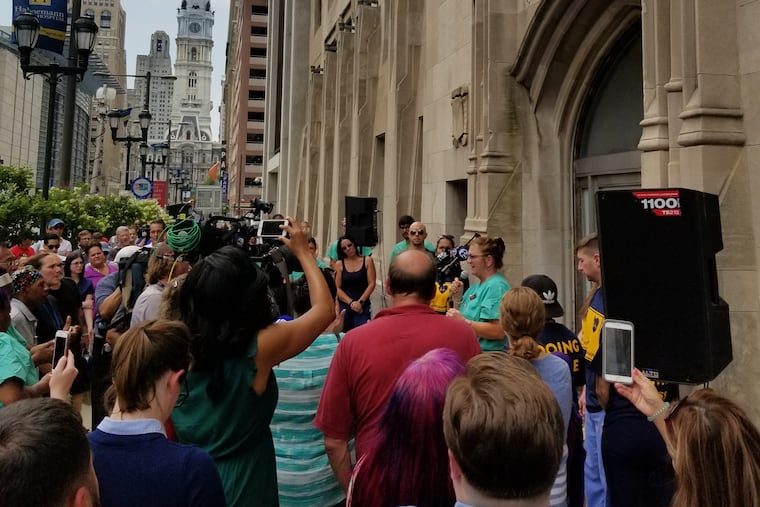Hahnemann’s closure will hurt patient care | Opinion
As President of a union representing over 4,000 nurses and healthcare professionals in the city — and as a nurse — I have real concerns about how the closure of Hahnemann will impact patients here.

If Hahnemann University Hospital closes, patient care will be dramatically affected across Philadelphia. Every major hospital in the city has emergency room visit times — time spent by patients before being admitted elsewhere in the hospital for care — above the national average of 332 minutes, according to the Centers for Medicare and Medicaid Services. Hahnemann’s decision to deregister as a trauma center has forced patients to be transferred to other hospitals represented by our union, the Pennsylvania Association of Staff Nurses and Allied Professionals (PASNAP), with Temple University Hospital being the main recipient.
As president of a union representing over 4,000 nurses and health-care professionals in the city — and as a nurse — I have real concerns about how the closure of Hahnemann will impact patients. I became a nurse because I believe that patients always come first. That’s why PASNAP is fighting so hard to stop the closure of Hahnemann. In my professional estimation, the disorderly closure of Hahnemann that is now on the table will result in patient deaths. We cannot let that happen.
Time spent in the ER at both Temple and Thomas Jefferson University Hospital exceeds both national and state averages. Nurses and health-care professionals have received no solid indication that other hospitals are prepared to safely accept Hahnemann’s patient population.
Annually, more than 40,000 patients have been cared for in Hahnemann’s emergency room, which serves a vulnerable patient population. Nearly half of Hahnemann’s patients are on Medicaid. In one of the fastest-growing parts of the city, patients most in need could be left without neighborhood access to critical care.
What is most concerning is that the closure of Hahnemann could lead to patient deaths. A 2014 study from Health Affairs journal found that emergency department closures in California led to a 5 percent increase in patient morbidity in the area surrounding the closed department. Another 2014 study of California closures, from the Journal of Acute Care Medicine, found that “the odds of inpatient mortality increased by 21 percent among trauma patients who experienced an increased drive time to their nearest trauma center as a result of a closure.”
In 2018, we in Philadelphia saw a significant — 11 percent — increase in gun violence homicides. This June, we saw an extremely deadly weekend with 19 shootings, leaving five dead and 28 wounded. Now is not the time to reduce our capacity to care for those who have had serious trauma.
Patients’ conditions in emergency rooms are often more complex than ever before. Data from the American Hospital Association show that emergency room patients are sicker than ever. That’s backed up by my front-line experience as a nurse at Temple. The typical patient has gotten sicker during my 35-year career as a nurse. As a result, it is unclear whether we will be able to give patients the same standard of care at Temple or Jefferson that they received at Hahnemann.
On Tuesday, nurses and health-care workers gathered in front of Hahnemann to showcase our central point: We do not have confidence in any assertion that a closure of Hahnemann will not adversely impact patient care. We are urging that state and local officials take all actions to keep Hahnemann open.
Maureen May is president of the Pennsylvania Association of Staff Nurses and Allied Professionals.